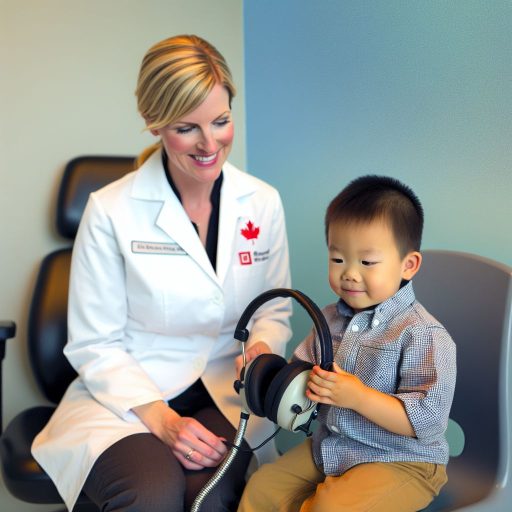Overview of Speech Pathology and Its Relevance to Mental Health
Speech pathology focuses on communication and swallowing disorders.
This field plays a crucial role in overall mental health support.
Effective communication enhances personal interactions and relationships.
Additionally, language skills impact cognitive development and self-esteem.
Speech pathologists work with individuals of all ages.
Communication Skills and Mental Well-Being
Effective communication skills are essential for mental well-being.
They allow individuals to express thoughts and emotions clearly.
This expression helps in building healthier relationships.
Furthermore, clear communication can reduce feelings of isolation.
Emotional Expression and Language Development
Language development is fundamentally linked to emotional expression.
Children and adults both benefit from improved language skills.
When individuals articulate feelings accurately, they can seek help effectively.
Speech pathologists often facilitate this important skill development.
Interventions in Diverse Settings
Speech pathologists collaborate in various environments.
They work with schools, hospitals, and rehabilitation centers.
These interventions enhance communication in those struggling with mental health issues.
Furthermore, they support recovery through tailored programs and resources.
Building Confidence Through Therapy
Therapy sessions often aim to boost individual confidence.
As clients improve their communication capabilities, they typically feel more assured.
This increased confidence promotes active participation in social settings.
Moreover, it fosters improved mental health outcomes over time.
The Role of Speech Pathologists in Identifying Mental Health Disorders
Understanding Communication and Mental Health
Speech pathologists play a crucial role in mental health support.
They recognize that communication difficulties can indicate mental health disorders.
For instance, individuals may struggle with expressing thoughts or emotions.
This often leads to misunderstandings in social interactions.
Unlock Your Career Potential
Visualize a clear path to success with our tailored Career Consulting service. Personalized insights in just 1-3 days.
Get StartedConsequently, speech pathologists assess these communication barriers.
Early Identification of Disorders
Early identification of mental health disorders is vital for intervention.
Speech pathologists are trained to spot signs that others might overlook.
They conduct comprehensive assessments to evaluate speech and language skills.
This includes understanding non-verbal cues and social communication skills.
By doing so, they can identify conditions like anxiety and depression.
Interdisciplinary Collaboration
Speech pathologists work closely with other mental health professionals.
They collaborate with psychologists, psychiatrists, and counselors.
This teamwork enhances the support provided to individuals.
For example, joint assessments can offer better insights into a person’s needs.
Furthermore, an interdisciplinary approach improves overall treatment effectiveness.
Creating Tailored Intervention Strategies
Based on assessments, speech pathologists develop personalized strategies.
These strategies address specific communication challenges related to mental health.
For instance, they might implement techniques for improving social skills.
Additionally, they can assist clients in expressing their emotions more effectively.
This tailored approach can significantly boost a client’s confidence.
Promoting Mental Wellness
Speech pathologists also support ongoing mental wellness initiatives.
They promote awareness about the connection between communication and mental health.
Workshops and community programs often focus on these connections.
Through education, they help reduce stigma surrounding mental health issues.
This advocacy is essential for fostering a supportive environment.
Techniques Used by Speech Pathologists to Support Communication in Mental Health Therapy
Creating a Safe Environment
Speech pathologists prioritize a safe space for clients to communicate.
This nurturing environment fosters open dialogue and encourages expression.
Clients feel comfortable sharing their thoughts and emotions in privacy.
Active Listening Skills
Active listening is a crucial technique in therapy sessions.
Speech pathologists model attentive listening to demonstrate empathy.
This practice encourages clients to feel heard and valued.
Utilizing Nonverbal Communication
Nonverbal cues play a significant role in communication effectiveness.
Speech pathologists teach clients to recognize body language signals.
Understanding these cues enhances clients’ overall communication skills.
Articulation and Clarity Exercises
Speech pathologists develop specific exercises for clarity of speech.
These exercises improve clients’ articulation and confidence while speaking.
Clear expression supports the overall therapeutic process.
Storytelling and Narrative Techniques
Storytelling aids clients in structuring their experiences effectively.
Speech pathologists guide clients in presenting their personal narratives.
This technique promotes understanding and emotional processing.
Mindfulness Practices
Mindfulness techniques can significantly enhance communication skills.
Speech pathologists introduce mindful breathing exercises during sessions.
These practices help clients stay present and articulate their thoughts clearly.
Collaboration with Mental Health Professionals
Speech pathologists work closely with psychologists and counselors.
This collaboration ensures a holistic approach to client care.
Coordinated efforts lead to more effective communication strategies.
See Related Content: Speech Therapy Techniques Used By Professionals
Collaboration between Speech Pathologists and Mental Health Professionals
Recognizing the Importance of Communication
Effective communication plays a vital role in mental health care.
Speech pathologists help individuals express their feelings clearly.
This clear expression supports the therapeutic process.
Additionally, they assist in improving social skills.
Enhanced social skills foster better relationships and reduce isolation.
Joint Efforts in Treatment Planning
Speech pathologists collaborate closely with mental health professionals.
Together, they develop comprehensive treatment plans.
This collaboration ensures that all aspects of a patient’s needs are addressed.
For instance, they might combine speech therapy with counseling techniques.
This combined approach provides a holistic treatment experience.
Training and Development
Continuing education strengthens collaboration among professionals.
Workshops often cover ways to integrate speech therapy in mental health settings.
Moreover, interdisciplinary training enhances understanding between fields.
As a result, both speech pathologists and mental health professionals benefit.
This growth ultimately leads to more effective patient care.
Creating Supportive Environments
Supportive environments promote healing and growth.
Speech pathologists contribute by creating nurturing spaces for communication.
They help establish trust between patients and professionals.
This trust facilitates open dialogue about mental health issues.
Consequently, patients may feel more comfortable sharing their experiences.
You Might Also Like: Choosing The Right Chiropractor For Your Needs
Successful Interventions by Speech Pathologists
Case Study: Enhancing Communication in Mental Health Settings
Dr. Emily Carter led a program at Green Valley Mental Health Clinic.
She utilized speech therapy techniques to enhance patient communication.
This approach significantly improved social interaction among patients.
Patients reported feeling more confident in expressing their thoughts.
As a result, group therapy participation increased dramatically.
Case Study: Supporting Children with Autism
At Sunny Days Pediatric Therapy Center, Ms. Julia Roberts worked with children.
She focused on integrating speech therapy with behavioral interventions.
This combination helped children improve their social skills effectively.
Parents noted marked improvements in communication at home.
Many children began forming friendships, enhancing their mental well-being.
Case Study: Speech Pathology in Depression Treatment
Mr. Kevin Nguyen implemented a unique program for patients with depression.
He combined speech therapy with cognitive-behavioral techniques.
This helped patients articulate emotions better and explore underlying issues.
Consequently, patients reported reduced feelings of isolation.
They developed healthier coping strategies for daily challenges.
Case Study: Stroke Recovery Programs
The Riverside Rehabilitation Center developed a comprehensive stroke recovery plan.
Therapist Lauren Fisher focused on speech and language rehabilitation.
This targeted recovery improved patients’ communication skills post-stroke.
Alongside, patients engaged in counseling sessions to address emotional impacts.
The holistic approach fostered both physical and emotional healing.
Case Study: Interventions in Schools
Willow Creek High School hired Mrs. Sarah Thompson as a speech pathologist.
She designed programs to support students facing anxiety and communication barriers.
Group sessions provided a safe space for students to express their concerns.
Such initiatives reduced overall school anxiety levels significantly.
Students expressed feeling more connected and valued within their peer groups.
Delve into the Subject: How Audiologists Support Patients With Hearing Aids

Educational and Advocacy Efforts by Speech Pathologists to Promote Mental Health Awareness
Raising Awareness Through Education
Speech pathologists play a crucial role in mental health education.
They provide resources to educators and families.
Through workshops, they share knowledge about communication and mental health.
These sessions often highlight the connection between speech and emotional well-being.
Additionally, they develop informative materials for various audiences.
By doing so, they foster a better understanding of mental health issues.
Furthermore, they collaborate with schools to implement programs.
These programs promote social communication skills in children.
Such initiatives can significantly impact emotional resilience in students.
Advocating for Support Services
Speech pathologists advocate for increased mental health services.
They work closely with local organizations to promote accessibility.
In addition, they participate in community events to raise awareness.
These events serve as platforms for addressing mental health challenges.
Moreover, they aim to reduce stigma around seeking help.
Their advocacy efforts often influence policy decisions.
By partnering with mental health professionals, they enhance support systems.
Utilizing Evidence-Based Practices
Evidence-based practices are integral to speech pathology interventions.
Speech pathologists implement strategies that are proven effective.
They evaluate the outcomes of their interventions regularly.
This evaluation helps in refining approaches for better results.
Furthermore, staying updated with current research is essential.
They continuously seek professional development opportunities.
Ultimately, these practices lead to improved mental health outcomes.
Collaboration with Other Professionals
Collaboration enhances the efforts of speech pathologists in mental health initiatives.
They often team up with psychologists, social workers, and educators.
This multidimensional approach addresses various aspects of well-being.
Such partnerships facilitate comprehensive support for individuals.
Joint initiatives expand the reach of mental health awareness campaigns.
Additionally, professionals share their insights and strategies with one another.
This exchange of knowledge strengthens their overall impact.
Explore Further: When to Consult a Podiatrist for Diabetic Foot Care
The Impact of Speech Therapy on Patients with Anxiety and Depression
Understanding the Connection
Speech therapy addresses both communication and emotional challenges.
Many individuals with anxiety and depression struggle to express themselves.
This lack of expression can exacerbate their mental health issues.
Speech pathologists provide a safe space for patients to share feelings.
They guide individuals in articulating their thoughts and concerns.
Therapeutic Techniques
Various techniques enhance patients’ emotional expression.
Therapy often starts with identifying specific speech challenges.
Pathologists incorporate breathing exercises to reduce anxiety.
Additionally, they teach relaxation techniques to manage stress.
Role-playing can also facilitate communication skills development.
Holistic Impact on Mental Health
Improved communication skills can boost self-esteem significantly.
As patients gain confidence, their anxiety levels often decrease.
Moreover, expressing feelings can lead to greater emotional awareness.
This process allows individuals to better handle their mental health.
Ultimately, therapy promotes overall psychological resilience.
Collaboration with Mental Health Professionals
Speech pathologists frequently collaborate with psychologists.
This teamwork provides comprehensive care to patients.
Long-term treatment plans often include integrated approaches.
Such coordination enhances outcomes for those struggling with mental health.
Both fields recognize the importance of effective communication in healing.
Future Trends in Integrating Speech Pathology with Mental Health Initiatives
Collaborative Care Models
Collaboration between speech pathologists and mental health professionals is on the rise.
This integration enhances the holistic treatment of clients.
By working together, they can address both communication and emotional challenges.
Such models improve overall patient outcomes significantly.
Telehealth Innovations
Telehealth has transformed how speech pathology services are delivered.
Remote consultations offer flexibility and accessibility for clients.
This technology supports individuals who might face travel or mobility issues.
As a result, it encourages more people to seek help for mental health concerns.
Increased Awareness and Training
Educational programs are emphasizing the importance of mental health in speech pathology.
Future training will include mental health awareness as a core component.
Speech pathologists will learn strategies to identify mental health needs in clients.
This approach enhances their ability to provide comprehensive care.
Focus on Evidence-Based Practices
Research is driving the integration of evidence-based practices in speech therapy.
Professionals are applying scientifically-backed methods to address communication issues linked to mental health.
This ensures that clients receive the most effective interventions.
Evidence supports the role of communication in emotional well-being.
Interventions for Diverse Populations
There is a growing recognition of the need for tailored interventions.
Speech pathologists are developing strategies for diverse populations.
They consider cultural and linguistic factors to improve mental health outcomes.
This customization enhances the relevance and effectiveness of treatment.
Policy and Advocacy
Advocacy for integrating speech pathology in mental health initiatives is gaining momentum.
Organizations are pushing for policies that support this approach.
Funding opportunities are being created to facilitate innovative programs.
This shift can lead to greater resources and support for professionals.
Additional Resources
Trainee Programs | VA Boston Health Care | Veterans Affairs
Children With Medical Complexity: An Emerging Population for …




